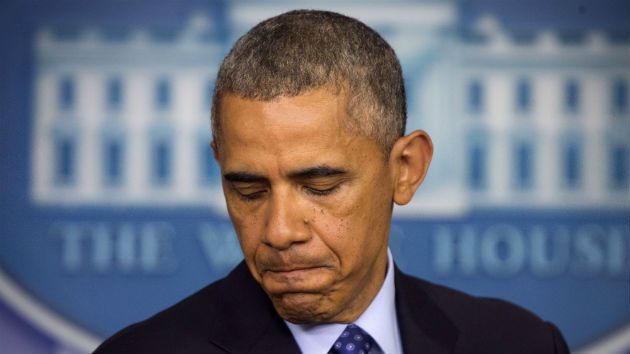Alwaght-The year 2016 will go down in history as one that set the pace for the rapid and inevitable decline of the United States’ influence in the West Asia region.
The actual erosion of the US influence in the West Asia region commenced in 2011 concurrent with the Islamic Awakening uprising across the region. Despite its massive military presence in terms of hardware and personnel the US has witnessed its authority being challenged while its hitherto enormous diplomatic power has also deteriorated.
Syria, case study of waning US power
The most outstanding case study of waning US power in West Asia region is the crisis in Syria. The gallant victory of Syrian forces and local allies against terrorists in the country's strategic city of Aleppo dealt a major blow to Washington's covert policy of balkanizing the country or creating a divisive Sunni enclave in this region and using it as a bargaining chip in talks to end the six-year crisis in the war weary Arab state. The US was further sidelined on the Syria issue following the formation of an alliance comprising Russia, Iran and Turkey which is charting the way forward on resolving the Syria crisis with the declaration of nationwide ceasefire being the first major breakthrough of this tripartite coalition. These three countries are also set to bring warring parties in Syria to the negotiating table in Kazakhstan's capital Astana without the involvement of the US.
US lost key ally, Turkey
The US is also losing control of its erstwhile NATO ally Turkey with ties between Ankara headed for turbulent times ahead due to continued Washington's backing for Kurds in northern Syria. The worsening of ties between these two countries was confirmed by Turkish President Recep Tayyip Erdogan who in late December stated unequivocally that "it's very clear" that the US-led coalition is supporting terrorist groups in Syria, ISIS among them. Apart from ISIS, he also mentioned Kurdish People's Protection Units in northern Syria (YPG) and Democratic Union Party (PYD) as groups supported by the US. Erdogan is worried about the growing power of Kurds in Syria which might be used to support Kurdish separatism in his country. Turkey has also indirectly blamed the US for backing a failed coup attempt in the country last July. Authorities in Ankara blame US-based Turkish cleric Fethullah Gulen of being behind the coup. Washington has refused Turkey's call for the cleric to be extradited.
US military, diplomatic weakness in Yemen
The crisis in Yemen has also exposed the extent of US military and diplomatic weakness in the West Asia region. Washington has failed to convince its ally, Saudi Arabia, to accept a UN plan to end its brutal invasion of Yemen. The roadmap presented by UN envoy to Yemen, Ismail Ould Cheikh, had proposed a unity government giving a third of power to ousted President Ali Abdullah Saleh, the Ansarullah movement and the Riyadh based opposition led by ex-president Abdurabuh Mansour Hadi. The US has also been arming the Saudi regime with banned weapons which have been used against Yemeni civilians since Riyadh started its aggression against the impoverished state in March 2015. US weapons have just been killing civilians, creating a backlash in the region. Despite sophisticated US weapons, the Saudis have also been unable to defeat Ansarullah militia and now in the Yemen quagmire.
US-led coalition failed to defeat ISIS in Mosul
In Iraq, the US which claims to be leading an international coalition against ISIS has failed dismally in evicting the Takfiri terrorist group from the war stricken northern city of Mosul. The advances in the war on ISIS in Mosul are only due to the close collaboration between the Iraqi army and the Popular Mobilization Forces or the Hashd al-Shaabi. ISIS grew powerful in Iraq because the US encouraged the group to develop in the hope that it would help to overthrow Syrian President Bashar al-Assad.
Washington-Riyadh ties worsened after Congress Veto
Saudi-Washington ties experienced a downturn in 2016 when Barack Obama suffered an exceptional political blow, when the US Congress reversed his veto of a bill that would allow families of the victims of the September 11 terrorist attacks to sue Saudi Arabia. US influence on Saudis is expected to further decline following insistence by President-elect Donald Trump that the kingdom and other Persian Gulf oil producers should compensate the US for the enormous cost of providing them with military protection.
Egypt abandons US for Russia
In mid-October last year Russia and Egypt held hold joint military exercises on Egyptian soil. Egypt has also signed arms deals with Russia worth up to $5 billion. With all these steps, Russia has been able to use Egypt to expand its military might in the Mediterranean, Africa and the West Asia region at the expense of the US. In October 2016, Egypt also backed a Russian-backed motion calling for a ceasefire in Syria. Egypt had known the support for the Russian measure would annoy the US and its ally Saudi Arabia. Egypt was previously considered a key US ally in the region but that is no longer the case.
There is no doubt that Washington is rapidly losing its clout in the West Asia region and this is bound to continue as incoming president Donald Trump's policy on the region is one fraught with contradictions.



























